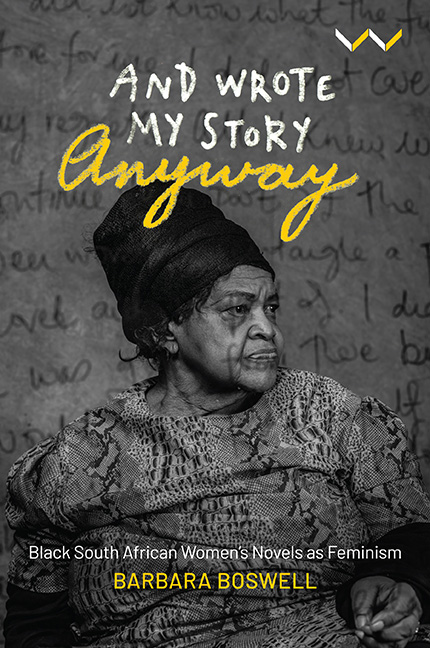Book contents
- Frontmatter
- Dedication
- Contents
- Acknowledgements
- Author's Preface
- Acronyms
- Introduction: ‘And Wrote My Story Anyway’: Black South African Women's Novels as Feminism
- 1 Writing as Activism: A History of Black South African Women's Writing
- 2 Rewriting the Apartheid Nation: Miriam Tlali and Lauretta Ngcobo
- 3 Dissenting Daughters: Girlhood and Nation in the Fiction of Farida Karodia and Agnes Sam
- 4 Interrogating ‘Truth’ in the Post-Apartheid Nation: Zoë Wicomb and Sindiwe Magona
- 5 Making Personhood: Remaking History in Yvette Christiansë and Rayda Jacobs's Neo-Slave Narratives
- 6 Black Women Writing ‘New’ South African Masculinities: Kagiso Lesego Molope and Zukiswa Wanner
- Conclusion: Towards a Black South African Feminist Criticism
- Select Bibliography
- Index
1 - Writing as Activism: A History of Black South African Women's Writing
Published online by Cambridge University Press: 15 June 2021
- Frontmatter
- Dedication
- Contents
- Acknowledgements
- Author's Preface
- Acronyms
- Introduction: ‘And Wrote My Story Anyway’: Black South African Women's Novels as Feminism
- 1 Writing as Activism: A History of Black South African Women's Writing
- 2 Rewriting the Apartheid Nation: Miriam Tlali and Lauretta Ngcobo
- 3 Dissenting Daughters: Girlhood and Nation in the Fiction of Farida Karodia and Agnes Sam
- 4 Interrogating ‘Truth’ in the Post-Apartheid Nation: Zoë Wicomb and Sindiwe Magona
- 5 Making Personhood: Remaking History in Yvette Christiansë and Rayda Jacobs's Neo-Slave Narratives
- 6 Black Women Writing ‘New’ South African Masculinities: Kagiso Lesego Molope and Zukiswa Wanner
- Conclusion: Towards a Black South African Feminist Criticism
- Select Bibliography
- Index
Summary
Black South African women's literary production should be understood within the wider political context which, in the period reviewed in this book, was dominated by apartheid. Though colonial South Africa was always racially segregated and marked, as with other colonial societies, by the exploitation of colonised bodies and the decimation of indigenous cultures and history, apartheid ideology became legally entrenched when the white Afrikaner National Party ascended to power in 1948. This chapter surveys South Africa's history during the twentieth century in relation to black women's literary production, focusing on the ways in which the apartheid doctrine and its policy of racial segregation affected black women's lives, both politically and as producers of writing. This history is structured in three broad sections: the segregation era, before formal apartheid (1910–1948); the apartheid era (1948–1990); and the post-apartheid era. For each historical period, I survey the laws and conditions that structured black South Africans’ lives; document women's resistance to forms of injustice and oppression; and survey the types of literatures black women produced as a result of, and in reaction to, the prevailing political conditions.
While male critics and writers such as James Matthews, Njabulo Ndebele, Michael Chapman and Richard Rive, among others, have created taxonomies of black literary output during apartheid – the Drum School of writing of the 1950s, the protest literature of the late 1950s and 1960s, and Black Consciousness writing of the 1970s and 1980s, others have taken issue with the reductive nature of the concept of ‘protest literature’. Writing in 1991, at the beginning of the transition to democracy, Mbulelo Mzamane asserted the following:
Now more than ever, it has become reductionist to categorise all African literature as protest. Protest literature is writing by the racially oppressed addressed to readers of the ruling class in an attempt to solicit their sympathy and support against discriminatory laws and practices … Protest springs from a feeling of being a ward: it is the activity of apprentices, and it is the action of subordinates who see themselves as such. It is both solicitous and moderate. (In Narismulu 1998, 197)
- Type
- Chapter
- Information
- And Wrote My Story AnywayBlack South African Women's Novels as Feminism, pp. 27 - 58Publisher: Wits University PressPrint publication year: 2021



